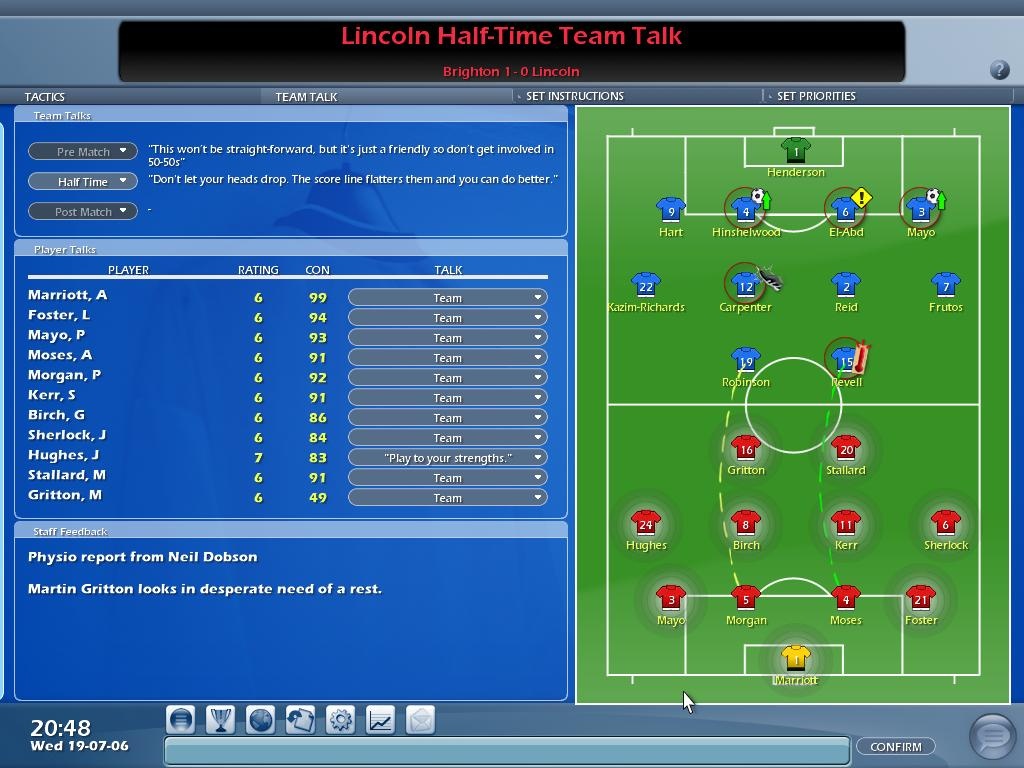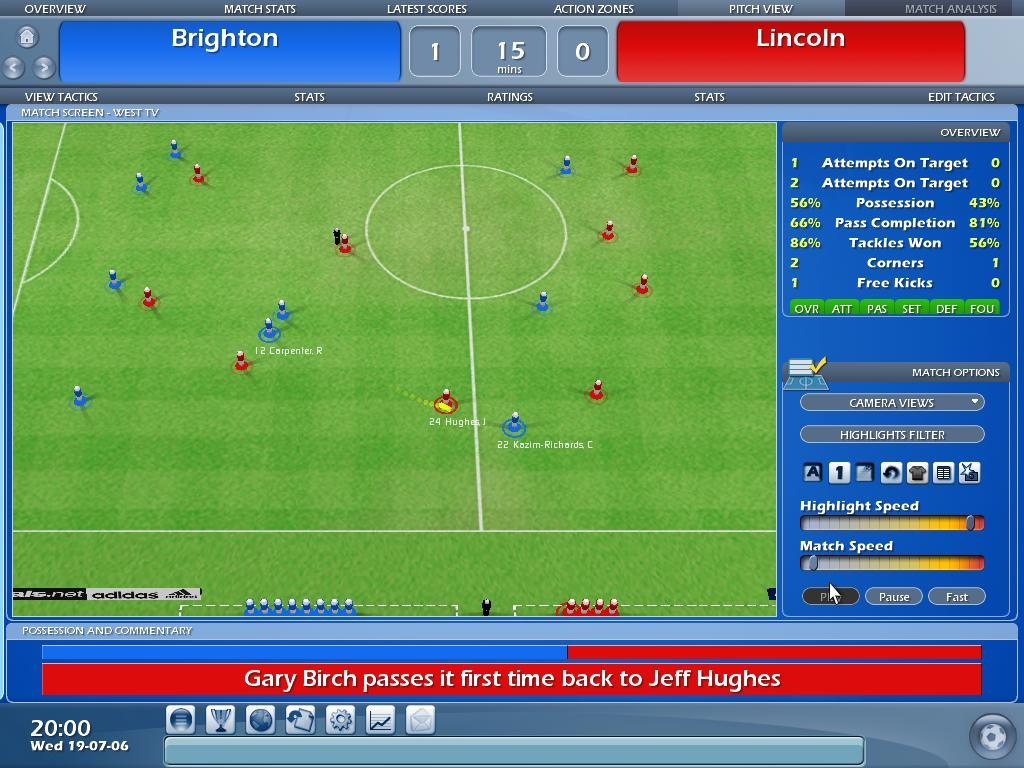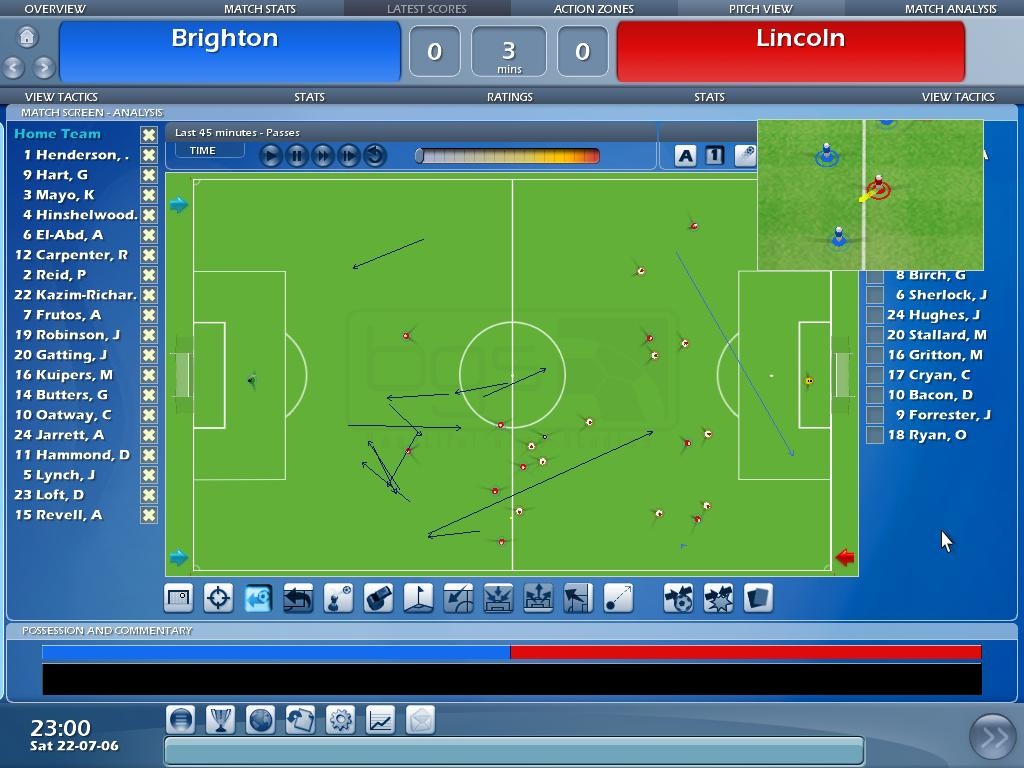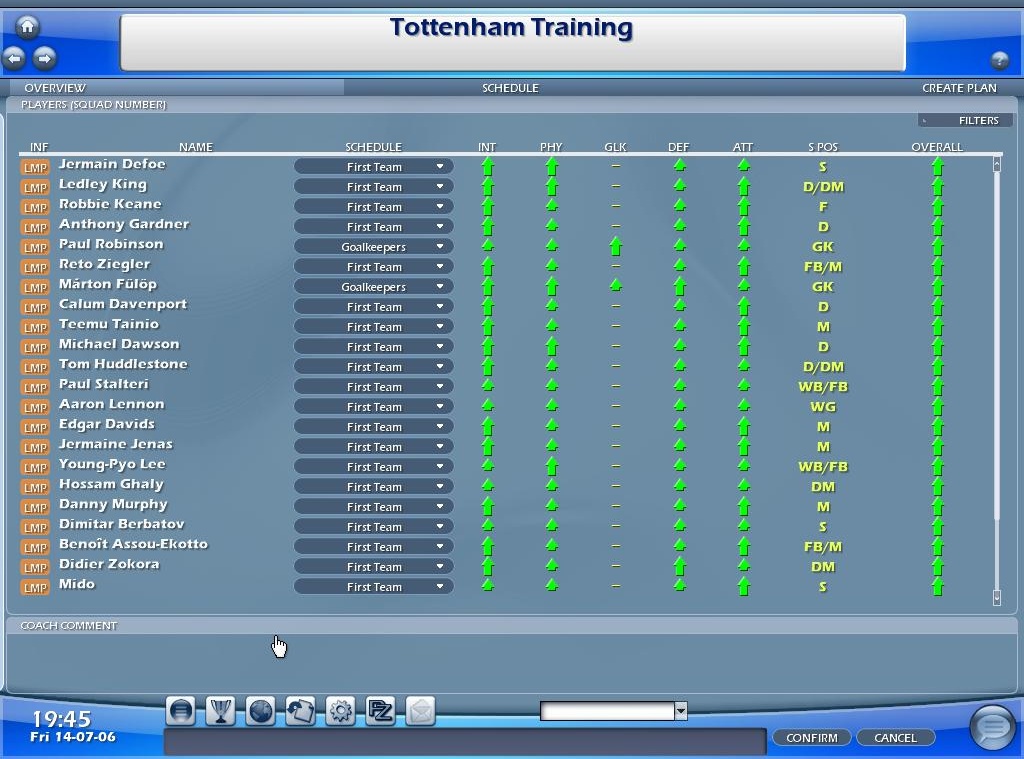Championship Manager is a name that has become synonymous in the UK for over a decade with the concept of a great, in-depth football management game. Originally developed by Sports Interactive, the game has been the responsibility of Beautiful Game Studios (BGS) since 2004. Unfortunately their initial attempts frankly weren't up to scratch but with the benefit of time and stability under the new SCi-Eidos regime, the team has succeeded in building those early efforts into something far more worthy of the CM brand.

This year's iteration is undoubtedly the most convincing edition yet and gives you the task of choosing any team from a total of 63 league tiers in 26 countries with which to find glory. What that glory might be will depend on your choice of team. Chelsea, for example, would no doubt demand an excellent showing in the English Premier League, as well as a more-than-respectable level of advancement in the Champions' League. But if you decide to opt for the likes of Farnborough Town, which would probably just settle for avoiding relegation from the English Conference South, a different kind of challenge would await you.
But your first choice, once you've set up your own manager's profile, is to work out which leagues you want to run and how much detail you'd like the game to go into. If you've got an older machine, it'll help to keep the number of active leagues relatively low and simulate the rest, although you can only take jobs from active leagues as determined at the start of the game. It's common to choose the country you want to start in, as well as a few others, and it's possible to limit the number of leagues playable within a given country.
Once that's done, and you've decided on a team, you'll be responsible for pretty much every decision you can think of that a football manager in real life would make. First of all, you'll need to think carefully about the players at your disposal and whether you want to mould a team around a certain formation, or vice versa. It's important, especially at lower-level clubs, to spend some time looking at the players' statistics--of which there are many--to see who might perform well in any given position.
Of course, there's far more to take into account than bare stats alone--the age, morale, and general happiness of a player can contribute to whether or not he'll perform. And until you've played a number of matches, it's hard to get a feel for a team that you don't know very well.
Fortunately, that's exactly what preseason is for, with a raft of friendly matches that will have been arranged for you. These games are designed to give your players the chance to gain match practice before the proper season begins, but also to give you the opportunity to experiment with formations and tactical settings. However, it's worth bearing in mind that the opposition is likely to be doing the same, so just how much valuable information you gather during this time is always open for debate.
The hub of the game focuses around match day itself. When your team is due to play, you'll see a list of fixtures onscreen, before being taken to the dressing room for the team talk. In CM 2007, you have the opportunity to utter some words of inspiration--or condemnation--before a match, during halftime, and after the final whistle. You can also talk individually to players, as well as give an overall address or keep quiet if you'd prefer. Different team members will respond better to different messages, depending on their personalities. A feedback area at the bottom of the screen will give you some idea about how certain players have reacted to your comments. As you progress in this way, you'll get an idea of how to motivate the various characters on your team to get the best from them.
After that, it's on to the real action, and you can choose to digest the match in a number of different ways. The game is played out automatically, without any intervention from you unless you decide to make a tactical change. As in real life, once the whistle blows, it's up to the players. You can view as much or as little of the on-pitch action as you like, but you'll usually want to stick to the highlights--near misses, red cards, injuries, and of course, goals.
When one of these highlights occurs, you can watch the match in a kind of 3D that's an approximation of what you might see on TV. Should you so desire, you can also change the viewing angle. Although players aren't represented realistically, as you might expect from something like FIFA 07, you get a good idea of the movement and the ball and players.

On the plus side, being able to see a game play out in this way gives you much more of a visual clue as to where your team is doing well, or not so well, and it's certainly easier on the eye than CM's text commentary roots. However, the drawback is that most people buying this game will be used to watching real teams play on TV, and unfortunately, BGS still has some work to do on sharpening up some of the player intelligence. There has definitely been an improvement made to the match engine since CM 2006, but watching just a handful of games will present a myriad of odd decisions.
For example, on a number of occasions, we witnessed situations where a challenge would occur on the edge of the area, which resulted in the ball trickling toward the goal and just past the post as the goalkeeper and nearest defenders stood by and watched. This usually resulted in a corner to the opposition--despite the fact that there was ample time and opportunity for one of our team's players to rescue the ball.
On another occasion, we managed to score from a free kick that was taken midway in the opposition's half. Curiously, most of the players on the pitch were huddled about 15 yards from where the kick was being taken, while a lone pairing of striker and defender stood on the penalty spot. The ball came in and was nodded home by our striker--the oddest-looking attack-free kick we've ever seen.
In terms of the instructions you can dish out to players, there's a really nice level of depth, although not a great deal on that front has been added for CM 2007. As previously, you can set free kick, corner, and penalty takers; assign the captaincy; and tell players your preferred attack or defence options. One thing that is new in CM 2007 is the opposition interaction board, which allows you to give your team instructions on how to treat the other team members.
Perhaps there's a player you think is temperamental. In that case, you can tell your players to wind him up. Or maybe there's a wing back who is a little low on confidence. With the underconfident wing back, you can get your team to try to beat him with the ball more often. You can even target an opposition player for rough treatment, although if you're not careful, this can end in yellow, or even red, cards against your players who have won.
When the match is played out and you've congratulated or commiserated with your players, it's back to the main screen to start the process all over again. While the transfer window is open, you can buy or sell players--providing you have the budget--with a massive number of clubs from around the world. Player names are accurate as of the European transfer window at the end of August, and thousands of players from each of the leagues and clubs represented have been re-created.

One of the major additions for CM 2007 is the licensing of ProZone technology, which is an extremely powerful tool used by real-life managers to assess the performance of players in a match. It tracks the movements of the football and players on both teams and can, therefore, break down a match into its component parts. Once you've played a game, you can view it in the ProZone tool and go into a great level of depth in assessing what went right, or wrong, with your team's performance.
You can opt to see all of the passes made in the match, those that were successful, or those that led to goals, and you can even replay the entire match while watching as specific events unfold. You might find, for example, that while your wingers are getting plenty of the ball, not enough of that is translating into chances on goal. Once you look in ProZone, you may discover that it's because too few of your crosses are being met by your strikers, and from there, you can decide to take one of a number of actions. Perhaps your crossing instruction is set too high for forwards that aren't good in the air. Maybe your wingers need more training on crossing. Or perhaps it's just an indication that the opposition defenders were extremely good at clearing the ball.
As in real life, it's probably a combination of factors, and there's no one answer that will suddenly have you scoring from crosses all the time. Much of the art of football management can't necessarily be defined so easily, which is maybe why we find the sport so fascinating in the first place.
Unfortunately, while the ProZone tool is a comprehensive one, there's not enough explanation of the different functions, and you'll spend a long time trying to work out exactly what is significant from what is trivial. With some development, it could become a very compelling tool. But because other parts of the game yield much more of an impact than hours of patient, dedicated match dissection, most players will probably gloss over it.

One of those areas is the aforementioned team talks, which offer you three stock comments on each occasion. In theory, your choice is supposed to be among an encouraging message, a damning critique, or a fairly steady note of praise. In practice, too often the lines are rather similar and don't represent the style of management you'd like to convey. In such cases, while saying nothing is an option, you limit the usefulness of such a talk.
In terms of the long game, CM 2007 has a massive amount to offer. With the sheer number of teams you can control, as well as the option of international management, the game is almost infinitely replayable during the course of a real-life year. Manager contracts are important in the game, and your success--or lack thereof--will often dictate the path your manager takes through the world of football. Regardless of how well you do, there's always something else to achieve or a new challenge to be found elsewhere, and that's one of the delights you'll find in this kind of game.
Something that's always been true of the BGS Championship Managers is the speed of processing game data, and once again, the developers have done a good job of keeping the game moving. By grading the amount of information in a game to your own computer's capabilities, you should be able to plough through a season in about a week or less of dedicated play. Regular news items will keep you up to date with what's happening in your virtual football world, and although this section of the game has been improved, you'll still see a number of stock phrases repeated. Sometimes the content of a message won't tally with the headline either. For example, one message title that hailed good news for a defender's recovery from injury actually notified us of a lengthy layoff, which was a little confusing. On the whole, the game is robust in this area, but sadly, there are still some details that make the willing suspension of disbelief a little harder than we would like.
Historically the CM series hasn't done too much to challenge the conventions that tell us football management games place a low emphasis on presentation. This edition of the game does feature some new skins, although most of them are pretty gaudy. On the whole information is relatively easy to come by, once you're used to the layouts of the various screens. Sound too is pretty basic, with some generic crowd noise which rises and falls with the ebb and flow of the game. Still, it all does a reasonable job, and if it's never spectacular it's at least consistent and functional.
Overall, Championship Manager 2007 is a compelling and deep football strategy game. It has a great breadth of options and represents a solid improvement on the last edition. However, while additions, such as the ProZone module, demonstrate real ambition to try new ideas--which is to be applauded--a sometimes scrappy match engine and a few other inconsistencies prevent this game from being even better. With more work, BGS could soon resurrect the CM name to its former critically acclaimed glory days, but for now, the game as a whole doesn't quite gel to perfection.